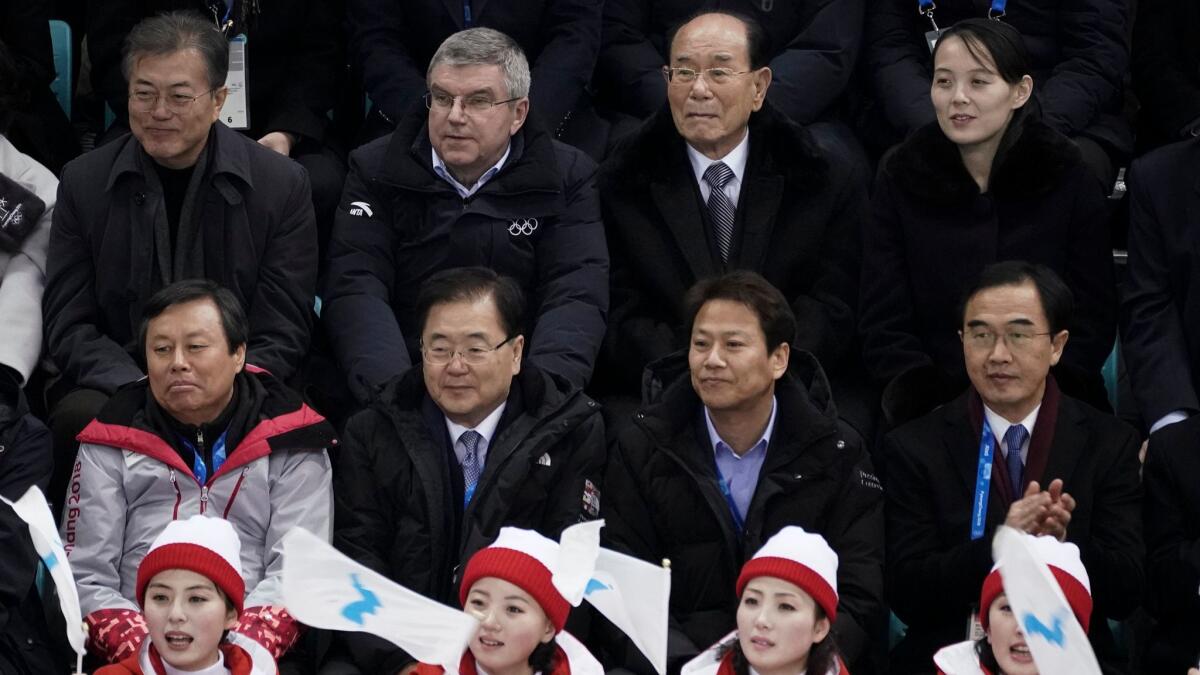Op-Ed: No, the Olympics will not defuse the North Korea crisis

- Share via
It was an inspiring sight: North and South Korean Olympic teams marching together behind a single unification flag. Could the opening ceremonies augur a new era of inter-Korean reconciliation?
Not likely. Pyongyang still refuses to abandon its nuclear arsenal or start a dialogue with the United States. Meanwhile, Washington has announced that the “toughest and most aggressive” sanctions against the regime are forthcoming.
When the Olympic flame leaves Pyeongchang, the nuclear crisis will return.
When the Olympic flame leaves Pyeongchang, the nuclear crisis will return. And it will do so even if South Korean President Moon Jae-in tries to keep the spirit alive by accepting a rare invitation from Kim Jong Un to visit the North for a summit meeting.
North Korea is close to being able to strike the American homeland with nuclear weapons. As national security advisor H.R. McMaster and Joseph Dunford, the current chairman of the Joint Chiefs, have made clear, President Trump finds this “intolerable” and has directed the military to prepare a preventive war option. Trump has also warned that the U.S. military is “locked and loaded” and threatened to “totally destroy” North Korea.
Some proponents of preventive attack, including people within the Trump administration, argue that it could be carried off with no consequences because North Korea would realize that it couldn’t prevail in an all-out war with the United States. But this view is predicated on an illogical assumption that the North’s allegedly non-deterrable madman would somehow make a sane and rational assessment of the costs and benefits.
In fact, any U.S. military operation against North Korea would carry dangerous consequences.
A minimalist strike would not end Pyongyang’s ICBM program. But it could very well spark a proportional response on U.S. military bases in South Korea. Would Washington accept those casualties, or escalate further?
An attack large enough to truly undermine the North’s ICBM program would require an extensive bombing campaign that could trigger what Defense Secretary James Mattis has warned would be a “catastrophic” war.
Escalating threats from both sides are driving the danger of miscalculation to an all-time high. Would North Korea understand that a limited U.S. strike wasn’t the beginning of a shock-and-awe campaign to induce regime change? Could Pyongyang misperceive a bloody nose attack as an attempt to decapitate its leadership?
The Congressional Research Service estimates that a conflict on the Korean Peninsula would leave “between 30,000 and 300,000 dead” in the first days of fighting. Casualty figures would soar higher if North Korea used its nuclear, biological and chemical weapons, or if China joined the conflict.
The emphasis on preventive attack undermines both components of the Trump administration’s “maximum pressure and engagement” strategy. Sanctions have been ramped up only recently; they require time to work.
Moreover, allies perceive the inclination toward preventive attack as inimical to their own interests. South Korea is concerned about becoming entangled in an unnecessary war, even as it fears abandonment by the United States in the face of North Korean threats.
Seoul worries that Washington won’t risk Los Angeles for Seoul, but that it would trade Seoul for Los Angeles. Concern is so acute in South Korea, in fact, that Moon thought it necessary to declare: “There cannot be any military action on the Korean Peninsula without a prior consent of the Republic of Korea.”
All this fear could lead to discord between the United States and South Korea, something that in turn could be exploitable by Pyongyang. The North’s participation in the Winter Olympics, which highlighted common Korean themes, is part of Kim’s campaign to drive a wedge between the allies.
If it plays a high-stakes game of brinkmanship, the United States will paint itself into a corner. By defining the completion of North Korea’s ICBM program as an intolerable and strike-inducing event, the Trump administration would be drawing a red line it is not necessarily prepared to hold.
Eventually, every poker player must deliver on their bet, or be revealed as a bluffer. If the United States comes out looking like a bluffer, American credibility will be gravely eroded.
We are now closer to a war on the Korean Peninsula than at any point since 1994. The Trump administration should avoid both a premature return to negotiations and a reckless preventive attack. Instead, it should respond to the growing threat by seriously pursuing its policy of “maximum pressure.”
The administration has taken some steps that are weakening the regime. It has successfully gotten other countries to break either diplomatic or economic ties to North Korea. But the administration continues to shy away from applying any real pressure on China. That’s a mistake.
Launching a preemptive military strike, without any indication that a North Korean attack is imminent, would be an even bigger mistake. We would be starting a war in order to prevent a war. As Otto von Bismarck observed: “Preventive war is like committing suicide out of fear of death.”
Bruce Klingner is a senior research fellow at the Heritage Foundation. He previously served as the CIA’s deputy division chief for Korea.
Follow the Opinion section on Twitter @latimesopinion or Facebook.
More to Read
A cure for the common opinion
Get thought-provoking perspectives with our weekly newsletter.
You may occasionally receive promotional content from the Los Angeles Times.









